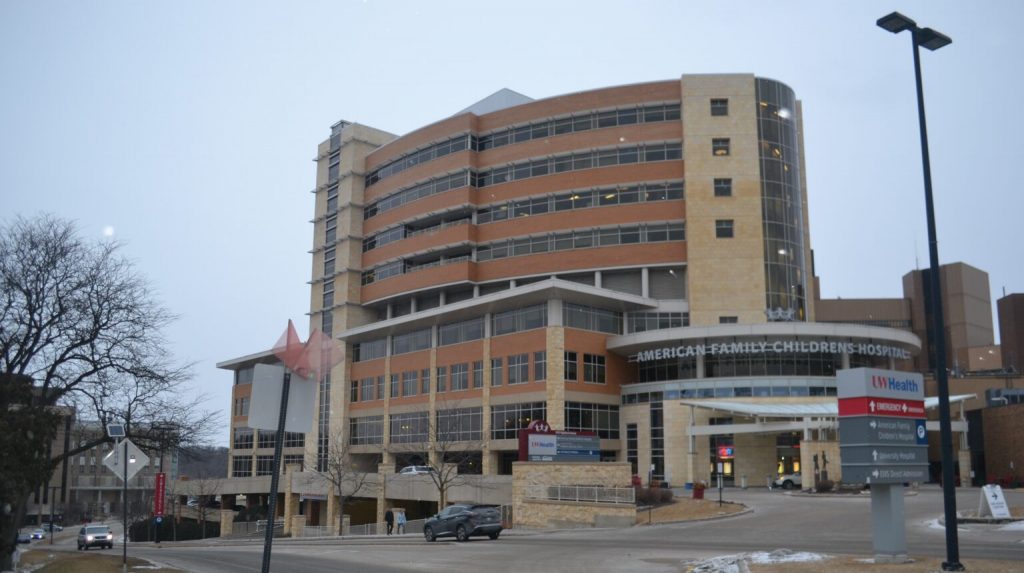Wisconsin Hospitals Provided More Unpaid Care in 2024
People without health insurance or regular health providers are using emergency rooms more.

American Family Children’s Hospital in Madison. An annual report from the Wisconsin Hospital Association says hospitals in the state are doing better financially, but face uncertainty. (Photo by Erik Gunn/Wisconsin Examiner)
Uncompensated health care at Wisconsin hospitals rose more then 30% in 2024 from the year before, according to a new report from the Wisconsin Hospital Association.
People without health insurance or regular health providers are using emergency rooms more, the report also finds.
The association annually assesses the state of Wisconsin hospitals, including their finances, utilization and staffing. The 2024 report was released Thursday.
“We are seeing a modest improvement in hospital financials across the state,” said Kyle O’Brien, president of the Wisconsin Hospital Association, in an interview. Nevertheless, he added, “there’s a lot of uncertainty in the health care market right now.”
While the state’s hospitals were doing better in 2024 than in the previous two years, 40 hospitals had a negative operating margin, O’Brien said, and many hospitals across the state where margins were positive, but narrow.
Uncompensated care includes charity care — provided by the hospital with the full knowledge that the cost won’t be covered — as well as bad debt: care for which the hospital expected to be paid but wasn’t.
In 2024, uncompensated care in both categories added up to $1.77 billion — a 30.5% increase over the 1.36 billion in uncompensated care in 2023.
O’Brien said several factors are responsible for that increase. One of those is generally higher deductibles on health insurance plans, requiring patients to spend more out of pocket before their insurance coverage kicks in.
“If that patient can’t pay for that higher out-of-pocket [expense], hospitals are the ones that either have to try to collect those dollars, or they are the ones that provide relief through charity care, bad debt policies, or things like that,” O’Brien said.
For hospitals, another top concern is how much Medicaid pays to cover the cost of care.
State budgets over the last decade have been increasing Medicaid hospital payments, O’Brien said, with the 2025-27 budget having the largest increases to date. Even so, he said, hospital Medicaid reimbursements fall short of fully covering the cost of the care that Medicaid is supposed to cover.
Decisions by health insurance to deny coverage are a source of “general consternation” for hospitals, O’Brien said — both with group health insurance policies but also for Medicare Advantage policies. Medicare Advantage policies are sold to people eligible for the federal Medicare program but are instead provided by private insurance companies.
O’Brien said the hospital association is also concerned about projected increases in people without health insurance as a result of higher premiums paid by people who buy their own insurance at the federal marketplace, HealthCare.gov, created under the Affordable Care Act.
Enhanced subsidies for HealthCare.gov policies enacted in 2021 will expire at the end of this year unless they are renewed. The subsidies are provided in the form of federal income tax credits for consumers who purchase insurance through HealthCare.gov
This week the state Office of the Commissioner of Insurance released projected rates for 2026 that reflected the loss of those enhanced subsidies.
Those higher costs have prompted widespread predictions that, after years in which enrollment in the marketplace plans has set new records, enrollment will drop off and more people with go without health insurance instead.
“We are certainly concerned anytime there’s a potential that somebody might lose coverage,” O’Brien said. Federal law requires hospitals to treat patients whether or not they are able to pay.
“We have been advocating with the congressional delegation to reauthorize those enhanced premium tax credits,” O’Brien said. He said members of Congress have been focused on “issues that are playing out right now [that] may be even bigger than hospital-related issues, but I think that they understand our concerns.”
Wisconsin hospitals report that unpaid care increased in 2024 was originally published by the Wisconsin Examiner.
If you think stories like this are important, become a member of Urban Milwaukee and help support real, independent journalism. Plus you get some cool added benefits.





















If readers are aware of neighbors or family members needing free health care or medications, please see these websites:
Free Community Clinic Collaborative (FC3; about 20 Milwaukee area free clinics):
Wisconsin Association of Free & Charitable Clinics (WAFCC; over 60 state wide free clinics):
If you’re a retired doctor, nurse, PA, NP, medical assistant, therapist, medical technician of any background, and find yourself with lots of time but nothing productive to do, please consider volunteering your services at one of these places!